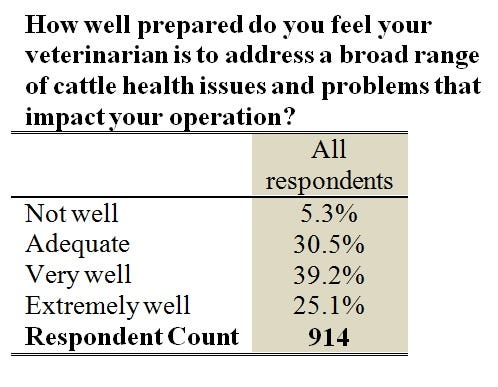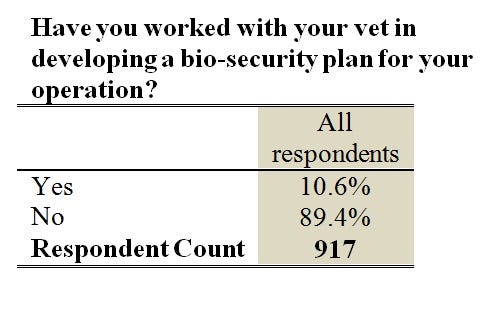Vets liked, but is it enough?
BEEF production survey shows high regard for large-animal vets, and perhaps room for added services.

A nationwide survey from BEEF and BEEF Vet shows the majority of beef producers believe they are getting adequate or better veterinary services.
It also implies some opportunities for improvements and perhaps for added profits.
There is still visible in this data a penchant to use veterinarians as problem solvers rather than predicament preventers. Here's an example: Although more than 36% of producers said their vets always adequately delve into causes of disease before prescribing a treatment, and almost 53% said their vets usually do so, less than 11% said they have worked with their veterinarian to develop a biosecurity plan.
Out of more than 900 survey respondents, only 94 claimed to have a biosecurity plan.
Further, only about 60% of beef producers say they usually develop a herd health plan with the advice of a veterinarian.
Therefore, planning prevention seems an area for growth.

Frequency or not
Only a little less than 10% said they never have a veterinarian come to their operations. A little less than 40% said the vet only comes out once or twice, and the rest said the vet is on their operation three times or more per year.
Also, beef producers view veterinarian pricing in a relatively positive light. Almost 38% said the prices they are charge are always fair, and 53% said veterinarian pricing is "usually fair."
Customer satisfaction is reasonable good, as 59% said they were very satisfied with veterinary services, 21% said they were somewhat satisfied, 16.5% said they were satisfied, and only 4% said they were not satisfied.
Management advice
About half of beef producers suggested they are open to getting management advice from veterinarians, but a little less likely to pay for that advice. Getting the cash register connected to these transactions appears to be a worthwhile goal.
When asked if, outside of direct herd health concerns, producers seek the advice of their general attending veterinarian in areas such as breeding/genetics, marketing, nutrition, beef quality or facilities design, about 45% said sometimes or often, while 55% said seldom or almost never. About 42% said they pay for this advice and about 58% said they do not or they believe it is hard to figure out pricing on such services.
Apparently, veterinarians are doing a good job of communication. Almost 96% of producers responded their veterinarian gives them clear and concise directions for treatment, which they and their employees can follow.

Shortage anxiety
Further, some claimed they can see potential shortages of large-animal veterinary services on the horizon. Some 67% said they currently have no local shortage, but 35% said they expect to in the long run and 17% said they expect to have problems soon. Almost 16% said they already have a shortage of care.
In part, this matters because 92% believe they clearly get better cattle care from a large-animal veterinarian who has some level of working background in livestock production.
VFD-ready?
In relation to the upcoming Veterinary Feed Directive guidelines, nearly half of producers report they have not yet established or do not know anything about a veterinary-client patient relationship (VCPR), a key requirement for veterinarians to "prescribe" a VFD for fed antimicrobials. There is no data to tell us whether this is a problem, as some operations may not need medicated feeds. Regionally, there are small differences, but it would be speculation to try to decipher.
About the Author(s)
You May Also Like


.png?width=300&auto=webp&quality=80&disable=upscale)
